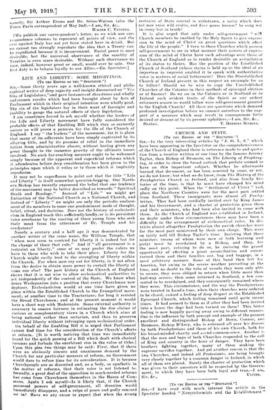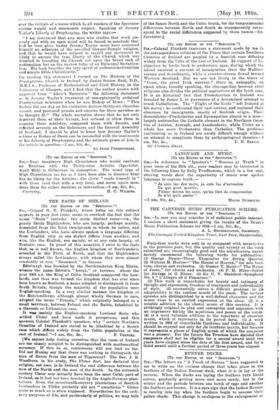(To THE EDITOR or THE ° SPECIATOG. ° ) SIR.- - T have read
with much interest the article in the Spectator headed "Nonconformists and the Establishment" over the initiate of a name which to all readers of the Spectator carries weight and commands respect. Speaking of Jeremy Taylor's Liberty of Prophesying, the Writer says:—
" I am convinced that any man who studies that work sin- cerely and with an open mind will be forced to conclude that had he been alive to-day Jeremy Taylor must have confessed himself an adherent of the so-called Cowper-Temple religion, and that he would have refused to regard any movement as likely to ensure the true liberty of the Church whioh was directed to founding the Church not upon the broad rock of nationalism but on the narrow ledge of an Episcopal Sectarian- ism. His book breathes the very spirit of undenoininationalism and simple Bible Christianity."
On rending this statement I turned up The History of the Presbyterian Church in Ireland, by James Seaton Reid, D.D., M.R.I.A., Professor of Ecclesiastical and Civil History in the University of Glasgow, and I find that the author quotes with approval from " Adair's Narrative" the following statement as to Jeremy Taylor's treatment of non-epiecopslly ordained Presbyterian ministers When he was Bishop of Down "This Bishop did one day on his visitation declare thirty-six churches vacant, and procured priests and curates for these parishes as he thought fit." The whole narrative shows that he not only deprived them of their livings, but refused to allow them to exercise their ministry, compared them with Jesuits, and reflected severely on the Reformers and the General Assembly of Scotland. I should be glad to know how Jeremy Taylor's actions as Bishop of Down can be reconciled with the sentiments of his Liberty of Prophesying and the estimate given of him in the article in qnestion.—I am, Sir, Ac., AN IRISH PRESBYTERIAN.







































 Previous page
Previous page